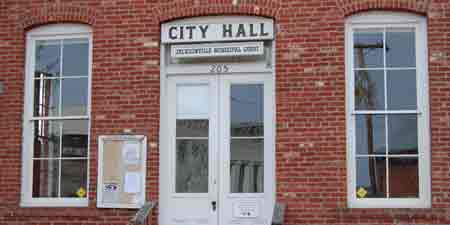 On September 6, a slim Council majority voted not to send a proposed watershed land swap deal to a public “advisory” vote. The action occurred after Council heard from supporters and opponents of a controversial plan that’s been brewing for years. The prior proposal being considered that was drafted during former City Administrator Paul Wyntergreen’s tenure calls for the city to trade 380 acres of its uppermost watershed land for 40 acres of lower watershed land.
On September 6, a slim Council majority voted not to send a proposed watershed land swap deal to a public “advisory” vote. The action occurred after Council heard from supporters and opponents of a controversial plan that’s been brewing for years. The prior proposal being considered that was drafted during former City Administrator Paul Wyntergreen’s tenure calls for the city to trade 380 acres of its uppermost watershed land for 40 acres of lower watershed land.
The lower 40 acres is owned by the Motorcycle Riders Association (MRA) and is used as a parking lot and staging area. The MRA 40 lies within the lower boundary of the Forest Park, which encompasses 1080 acres of the 1800 acre watershed. Proponents of Forest Park say removing the MRA from the park is critical to its success. Stakeholders say all plans to trade parcels include environmental mitigation measures that address safety, road easements, stream water, wildlife, erosion and other concerns brought on by MRA uses.
If the swap succeeds, the city could receive upwards of $845,000 from MRA funds – garnered from a portion of Oregon state gasoline tax to foster OHV use. According to staff and Council, funds could be used to repair the aging reservoir in Forest Park, to build a community center, and/or pay off existing city debt. Former Mayor Clara Wendt spoke to the advantage of using funds for dam repairs and paying down debt on the Police Station, cemetery land and water bonds.
The council packet for the meeting included a variety of letters from concerned citizens, most of which favored an advisory vote and opposed the MRA. Another document, a memo dated August 16 from City Recorder Jan Garcia to City Administrator Jeff Alvis restated portions of a conversation on the issue. The memo stated, “An advisory vote could be taken, but Kurt (Kurt Knudsen, City Attorney) recommends strongly against this…he said an advisory vote would only be done if the officials wanted to protect themselves if they were afraid of making the public mad. He has been representing governments and agencies for 30 years and has only done around 4 advisory votes.”
Mayor Paul Becker led the Council discussion and called for any sale proceeds to be placed into a separate fund for a variety of city projects. As a leading advocate of building a new community center, Becker made no secret of his desire to use land swap funds to help fund that effort. Councilor Jim Lewis then reminded his fellow councilors that they were elected to make decisions and not send matters to “advisory” votes. Lewis warned against setting a bad precedent and asked hypothetically if his fellow councilors would call for an advisory vote the next time the city needed to purchase a new fire truck. Councilor Donna Schatz expressed her belief that the nation was in trouble due to a lack of public trust in government, arguing that an advisory vote would restore that trust.
Shortly thereafter, Councilor David Jesser made a motion to “hold an advisory vote, despite the advice of legal counsel.” That motion got the discussion rolling but was ultimately defeated by a 4-3 margin when Councilors Christina Duane, Jim Lewis, David Jesser, and Mayor Becker voted against an advisory vote. Councilors Dan Winterburn, Donna Schatz and Paul Hayes voted in favor of the public vote. It is worth noting that Council deliberations had also included a motion by Councilor Duane to form a new citizen’s advisory group to study the matter further. Her motion did not receive a second and therefore failed. In the end, Council tabled the matter but says it intends to work toward an eventual MRA-City land swap agreement with broad community support. Unfortunately, other than expressing the need for future public meetings and educating the public, neither staff nor council provided any clear direction on how they intended to settle the matter.
